AS HE takes up is new diplomatic role in the US after four years as Ireland’s Ambassador to Britain, Dan Mulhall tells SIOBHAN BREATNACH about the challenges that lie ahead with Brexit and why Britain should harness the power of the second and third generation Irish.
Was being Irish Ambassador to Britain as challenging as you expected?
Yes, in a very good way first of all, in that shortly after my arrival I discovered that I would be the Ambassador in London during the first ever State Visit.
To see our relationship arrive at the peak of friendship and warmth during the State Visit (2014) was a career highlight and I will never forget those four days in London.
It gave a boost and we were then able to take that forward from there in a very positive way. The last year or so has been very challenging in ways that are not so positive because it brings a new dimension to our relations and has created challenges for the past year and will be a challenge for the year ahead.
I’ve had two referendums and two elections, which in a four-year period is quite extraordinary.
What will Brexit mean for both the older and younger Irish in Britain?
We want Britain to be a successful, outward-looking, dynamic, prosperous economy on good terms with its neighbouring countries including Ireland.
But that outcome is not guaranteed, that’s going to require a lot of effort in the coming years. For the Irish community here in Britain, they have an interest in this country being successful because the success of Britain is going to benefit them.
They also have an interest in British-Irish relations remaining on a good level. All of these things are certainly achievable.
For Irish people coming here in the future, Britain may be a less attractive place. Again it depends, if Britain succeeds in making a success of its future then clearly Irish people will respond accordingly.
But if Britain does suffer economic consequences from Brexit, then that will clearly be a disincentive for Irish people in the future to come here.
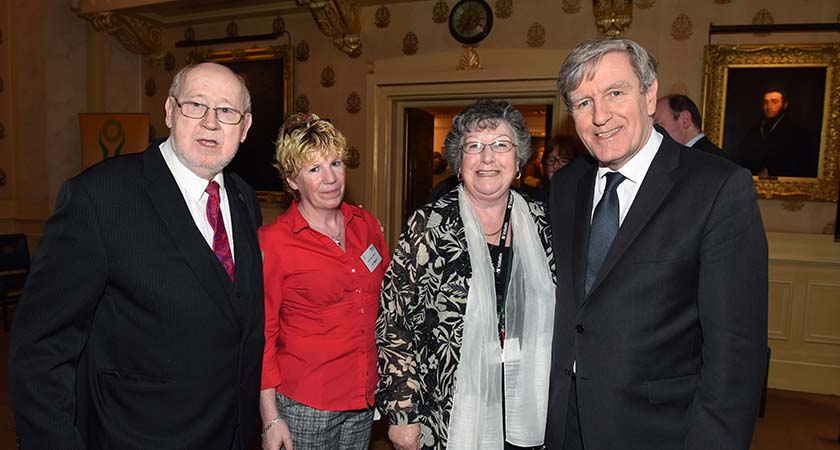 Irish Ambassador Dan Mulhall is pictured right with Richard Lucas, Jo Higgins and Ann Lucas from Irish Community Services
Irish Ambassador Dan Mulhall is pictured right with Richard Lucas, Jo Higgins and Ann Lucas from Irish Community ServicesHas there been enough focus on Northern Ireland post Brexit?
Sadly, during the referendum campaign hardly any attention was paid to the implications of a leave vote for Ireland and Northern Ireland, the border and so forth.
Since that time I think, in fairness, the level of awareness of the challenges faced in Northern Ireland and on the border has risen greatly and the fact that it made its way into the Prime Minister’s Article 50 letter is evidence of the fact that it has achieved greater profile than would have been the case before the referendum when frankly it was a case of ‘everything will be fine, don’t worry’.
We’ve got to make sure that everything will be fine. Since the referendum we have been extraordinarily active both here and around Europe.
The proof of the pudding is that both the British letter of Article 50 and the EU’s response fully reflected the Irish position so I don’t see any basis for criticism of anyone.
So far so good – obviously negotiations haven’t finished yet. Remember, there are only three issues being dealt with – financial settlement, rights of citizens and Ireland.
That means there has to be sufficient progress on those issues, including Ireland before the next phase can start – a lot of pressure there.
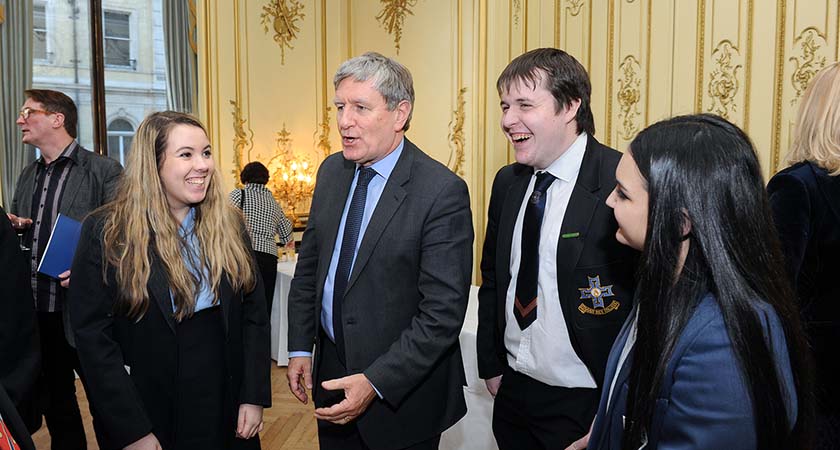 Irish Ambassador Dan Mulhall pictured at one of the many community events hosted at the Irish Embassy
Irish Ambassador Dan Mulhall pictured at one of the many community events hosted at the Irish EmbassyWhat have you learned from the Irish community in Britain?
What I will take away is the diversity of the Irish community here. Basically anything that exists in Ireland exists here in Britain in sort of a scaled down version. One of the things I remember is I launched the London Irish LGBT group.
Now probably there aren’t many other countries in the world where there would be an Irish LGBT group but in London it’s perfectly natural there would be because of the scale of our community here.
I’ve meet people who have been here a few months and I’ve met people who’ve been here 70 years plus. What strikes me about the people who’ve been here for a long time is how Irish they are and how they have retained their sense of Irishness.
I’m impressed by the fact that they’ve retained a grá for our country. That’s very admirable and something I value greatly.
I’ve come to the conclusion you can’t understand Irishness without understanding Irishness as it manifests itself around the world, including here in Britain.
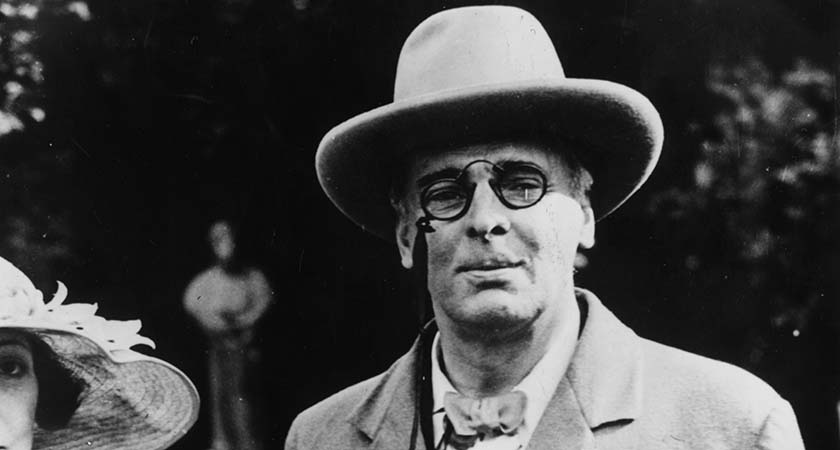 The Ambassador tweets a daily poem, including those by Irish poet William Butler Yeats, pictured here (Picture: Topical Press Agency/Getty Images)
The Ambassador tweets a daily poem, including those by Irish poet William Butler Yeats, pictured here (Picture: Topical Press Agency/Getty Images)You’re a fan of Twitter - has connecting with people on social media been a positive experience?
I’ve not had any abuse directed at me, why that is I don’t know, but I tweet carefully. I don’t go out of my way to offend people. But what I found is that most people out on Twitter are living lives of quiet satisfaction - the angry ones get a lot of attention but you can probably ignore them most of the time.
For example, my daily poetry tweet has been a great success...people saying ‘oh I remember reading that poem in school, that was my mother’s favourite poem.’
I’ve hit, by accident almost, on a little formula for doing something that adds to the sum of human happiness in a small way. I’ll find a way of doing it late at night in America for the morning.
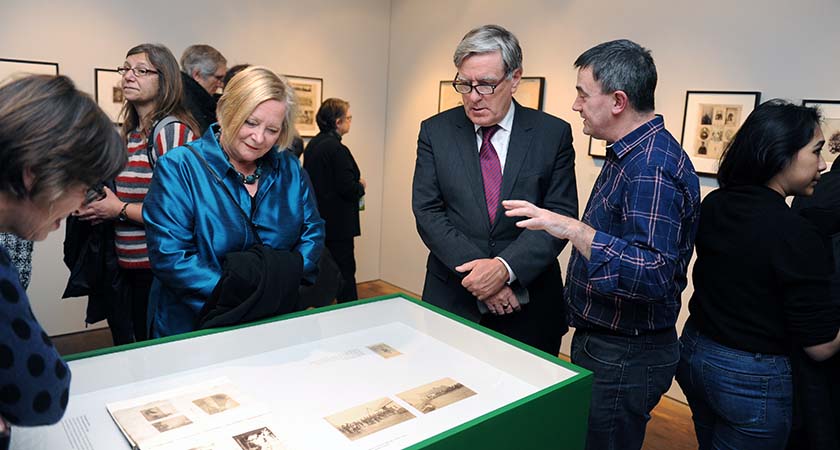 1916 exhibition curator Luke Dodd with Irish Ambassador Dan Mulhall and his wife Greta. (Picture: Malcolm McNally)
1916 exhibition curator Luke Dodd with Irish Ambassador Dan Mulhall and his wife Greta. (Picture: Malcolm McNally)What’s the future for the Irish in Britain?
The needs of our community in Britain are increasing, if anything, because the community is ageing. The large-scale emigration that occurred in the 50s and 60s and so on, those people are now beyond retirement and inevitably there are challenges they face.
The (Irish Government Emigrant Support) programme is more and more orientated towards dealing with those challenges - people who don’t have the networks that might be normal in a community in Ireland.
I think the Irish community has really come into its own in the last 20 years because the burden of the Northern Ireland Troubles has been lifted from their shoulders and they’re now valued in a way that was perhaps not always evident.
They deserve great credit for having been proudly Irish all those years despite the difficulties that surrounded them because of what was happening in the Troubles context.
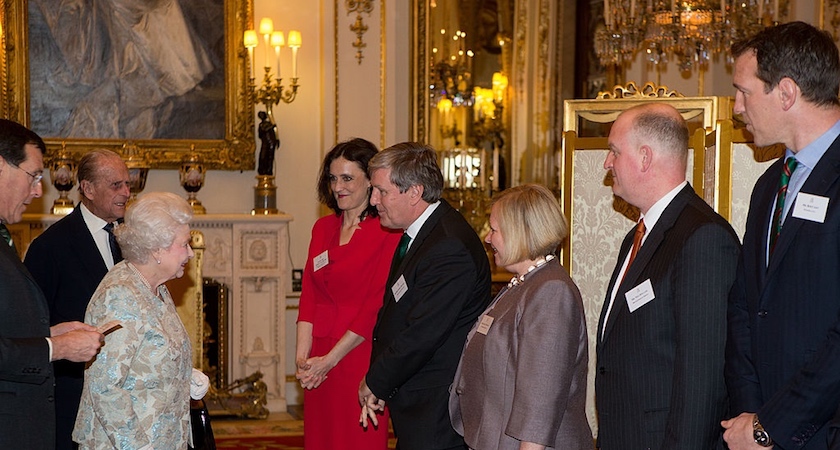 The Ambassador meets Queen Elizabeth II at a reception for the Irish community at Buckingham Palace ahead of the Irish State Visit to Britain. (Picture: Steve Parsons/PA Wire)
The Ambassador meets Queen Elizabeth II at a reception for the Irish community at Buckingham Palace ahead of the Irish State Visit to Britain. (Picture: Steve Parsons/PA Wire)How would you hope your time in Britain will be remembered?
We’ve made such good friendships and connections here that I hope people will remember me fondly but I know that my successor (Adrian O’Neill) will also bring his special gifts and talents to the job.
I hope my tenure will be remembered for the fact that I was here for the State Visit and that people remember that I was genuinely committed to the Irish community in the round.
I wanted to engage with the community in its widest possible manifestation.
It’s not just the ones who have been here a long time who feel very Irish, I think the younger generation that’s come here in recent times under very different circumstances they also feel very Irish. It’s extraordinarily rare considering a lot of people left in very different circumstances.
I’ve dealt with survivors of institutional abuse and various groups of people who had every right and reason to be negative about Ireland but who still have a very strong bond with the country.
A lot of the people I met, even retired people are going home four or five times a year, younger people over here are going home for weekends on a regular basis.
I think it’s a different experience now being Irish in Britain from what was the case in the past.
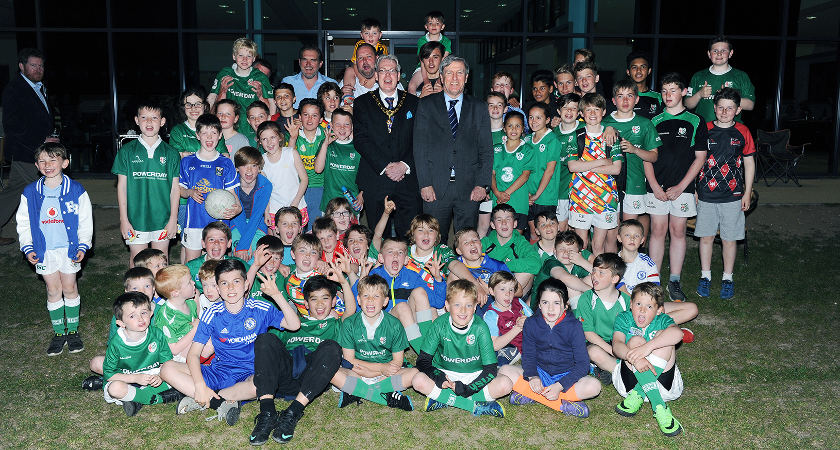 Irish Ambassador Dan Mulhall and the Mayor of Spelthorne Borough Council Cllr Mark Francis and his wife Catherine are pictured with youngsters of Gael Londain (Picture: Malcolm McNally)
Irish Ambassador Dan Mulhall and the Mayor of Spelthorne Borough Council Cllr Mark Francis and his wife Catherine are pictured with youngsters of Gael Londain (Picture: Malcolm McNally)Are there any regrets or things you wish you’d achieved?
One of the things I’ve been thinking about in recent times is how to cultivate Irishness in the second, third and fourth generations here.
I’m going to America now and I know for a fact that I will meet people who will be proud of their Irish identity but who are descended from a grandparent - a great, great grandparent - maybe someone who left Ireland in the 19th century but who still feels in some way an identification to Ireland, which is valuable for us.
That doesn’t really exist in Britain to any great extent. I can see why, the Troubles probably intervened and discouraged people who were not Irish-born from identifying with us.
There’s now an opportunity to maybe find a way in which we could bring together people of Irish descent to listen to them and hear what it is they think would connect them with Ireland and make them and their children feel a continued association with Ireland.
If I was staying on longer I would try to deal with that one – can we create a sense of Irishness in Britain akin to what exists in the United States? Maybe it’s impossible but I think we should have a go at it.
I know it’s done to some extent - the GAA does it. Comhaltas does it as well, but it’s a band of people for whom the identity is transmitted by the GAA or the music, but is there a way of doing that in a more general way?
Look at what Irish America has done for Ireland, that sense of Irishness that no American government, no American president, can ignore because there is a sense of, it’s obviously changing as well, but it’s still a phenomenon.
Here in Britain you stand on the shoulders of 700,000 Irish-born people, but it would be nice to stand on the shoulders of the 10million or so who are probably of relatively recent Irish decent but who may have no sense of it.
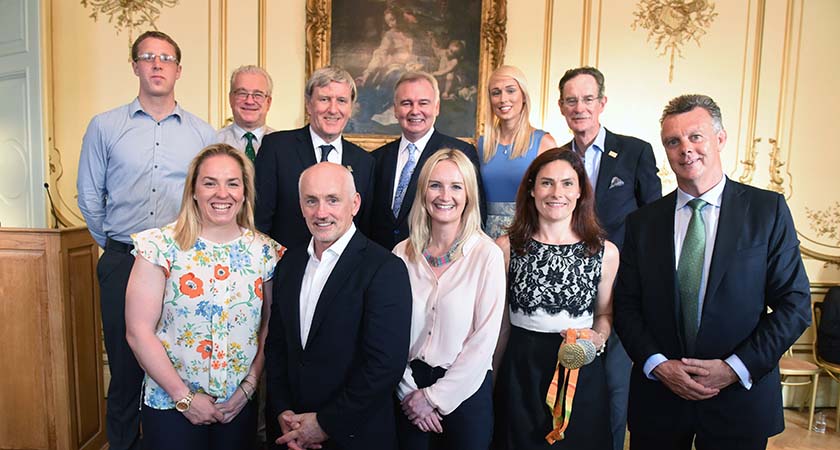 The Ambassador with some Ireland's sporting great and personalities including back LtoR: Mark Gottsche, Ross McCollum, Eamonn Holmes and Stephanie Roche. Front LtoR: Niamh Briggs, Barry McGuigan, Maggie Doyle, Katie-George Dunlevy and David O'Leary
The Ambassador with some Ireland's sporting great and personalities including back LtoR: Mark Gottsche, Ross McCollum, Eamonn Holmes and Stephanie Roche. Front LtoR: Niamh Briggs, Barry McGuigan, Maggie Doyle, Katie-George Dunlevy and David O'LearyFinally, what will you miss most?
My walks around Hyde Park in the morning and I’ll miss the Irish community. We made some great friends here.
And of course, I’m a great sports fan so I’ll miss the rugby internationals, I’ll miss attending premier league matches but I will find substitute activities in Washington and no doubt I’ll be kept fairly busy. In my career to date, which stretches back nearly 40 years, this has been the highlight.
It remains to be seen whether I can match that during my next assignment in Washington, I leave here with a heavy heart but lots of good memories.
There are many challenges ahead for my successor and I wish him all the very best and know he will take on the role with great aplomb.

